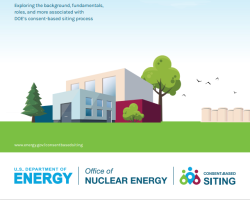Category of Content
Siting Experience Documents Only
Publication Date
Subject Matter
Country
Keywords
Overview - Potential Nuclear Plant Closings in Illinois
Overview - Potential Nuclear Plant Closings in Illinois
DOE Announces Three Potential Sites for Proposed Monitored Retrievable Storage Facility
DOE Announces Three Potential Sites for Proposed Monitored Retrievable Storage Facility
Press Release - Three potential candidate sites for a facility to handle, package and temporarily store spent nuclear fuel have been identified by the U.S. Department of Energy (DOE). If approved by Congress, the facility would receive spent fuel from commercial nuclear power plants nationwide and package it for delivery to a permanent repository for final disposal.
Investigation of Nuclide Importance to Functional Requirements Related to Transport and Long-Term Storage of LWR Spent Fuel
Investigation of Nuclide Importance to Functional Requirements Related to Transport and Long-Term Storage of LWR Spent Fuel
Dose Rate Calculations for the 2-MCO/2-DHLW Waste Package
Dose Rate Calculations for the 2-MCO/2-DHLW Waste Package
Thermal Modeling of NUHOMS HSM-15 and HSM-1 Storage Modules at Calvert Cliffs Nuclear Power Station ISFSI
Thermal Modeling of NUHOMS HSM-15 and HSM-1 Storage Modules at Calvert Cliffs Nuclear Power Station ISFSI
WHF and RF Thermal Evaluation
WHF and RF Thermal Evaluation
Waste Package Neutron Absorber, Thermal Shunt, and Fill Gas Selection Report
Waste Package Neutron Absorber, Thermal Shunt, and Fill Gas Selection Report
Social Distrust: Implications and Recommendation for Spent Nuclear Fuel and High Level Radioactive Waste Management
Social Distrust: Implications and Recommendation for Spent Nuclear Fuel and High Level Radioactive Waste Management
This review develops recommendations for moving forward with SNF and HLW management in a context of social distrust, while also working to regain social trust over the long term. We begin with a short overview of social trust and confidence, including definitions, how it is built and destroyed, and trends in social trust in the US. We then turn to the implications of dilemmas and trade-offs that arise for the design and implementation of a system that has requirements in addition to trust and confidence.
COMMUNITY GUIDE TO ENVIRONMENTAL JUSTICE AND NEPA METHODS: PRODUCT OF THE FEDERAL INTERAGENCY WORKING GROUP ON ENVIRONMENTAL JUSTICE & NEPA COMMITTEE
COMMUNITY GUIDE TO ENVIRONMENTAL JUSTICE AND NEPA METHODS: PRODUCT OF THE FEDERAL INTERAGENCY WORKING GROUP ON ENVIRONMENTAL JUSTICE & NEPA COMMITTEE
The Community Guide to Environmental Justice and NEPA Methods provides information for communities who want to assure that their environmental justice (EJ) issues are adequately considered when there is a Federal agency action that may involve environmental impacts on minority populations, low-income populations, and/or Indian tribes and indigenous communities. Such Federal actions include:
Communicating Risks and Benefits: An Evidence-Based User's Guide
Communicating Risks and Benefits: An Evidence-Based User's Guide
Effective risk communication is essential to the well-being of any organization and those people who depend on it. Ineffective communication can cost lives, money, and reputations. Communicating Risks and Benefits: An Evidence-Based User's Guide provides the scientific foundations for effective communication.
Let the Talk Count: Attributes of Stakeholder Engagement, Trust, Perceive Environmental Protection and CSR
Let the Talk Count: Attributes of Stakeholder Engagement, Trust, Perceive Environmental Protection and CSR
This article tests the links between attributes of stakeholder engagement (information sharing [quantity and quality of information sharing], procedural fairness [respectful treatment and providing voice], and empathy) and local communities’ acceptance of corporate social responsibility (CSR) initiatives with the mediating roles of trust and perceived environmental protection. Using Ghana as a case, survey data were collected from 604 local inhabitants in mining communities for the study.
Monitored Retrievable Storage Facility Conceptual Design Report
Monitored Retrievable Storage Facility Conceptual Design Report
Monitored Retrievable Storage Facility Design Criteria Policy Document - 2nd Draft
Monitored Retrievable Storage Facility Design Criteria Policy Document - 2nd Draft
Criticality Consequence Calculation Involving Intact PWR MOX SNF in a Degraded 21 PWR Assembly Waste Package
Criticality Consequence Calculation Involving Intact PWR MOX SNF in a Degraded 21 PWR Assembly Waste Package
EQ6 Calculations for Chemical Degradation of PWR LEU and PWR MOX Spent Fuel Waste Packages
EQ6 Calculations for Chemical Degradation of PWR LEU and PWR MOX Spent Fuel Waste Packages
Data Qualification Report: Mineralogy Data for Use on the Yucca Mountain Project
Data Qualification Report: Mineralogy Data for Use on the Yucca Mountain Project
Criticality Consequence Analysis Involving Intact PWR SNF in a Degraded 21 PWR Assembly Waste Package
Criticality Consequence Analysis Involving Intact PWR SNF in a Degraded 21 PWR Assembly Waste Package
National Environmental Justice Advisory Council: 20-Year Retrospective Report (1994-2014)
National Environmental Justice Advisory Council: 20-Year Retrospective Report (1994-2014)
This report documents the work of one of the most successful Federal advisory committees in the history of the U.S. Environmental Protection Agency (EPA). The National Environmental Justice Advisory Council (NEJAC) was established by EPA on September 30, 1993 to provide independent advice to the EPA Administrator on broad, cross-cutting issues related to environmental justice.
Intact and Degraded Mode Criticality Calculations for the Codisposal of ATR Spent Nuclear Fuel in a Waste Package
Intact and Degraded Mode Criticality Calculations for the Codisposal of ATR Spent Nuclear Fuel in a Waste Package
Application of Sensitivity/Uncertainty Methods to Burnup Credit Criticality Validation
Application of Sensitivity/Uncertainty Methods to Burnup Credit Criticality Validation
OECD/NEA Burnup Credit Criticality Benchmark, Analysis of Phase II-B Results: Conceptual PWR Spent Fuel Transportation Cask
OECD/NEA Burnup Credit Criticality Benchmark, Analysis of Phase II-B Results: Conceptual PWR Spent Fuel Transportation Cask
Consent-Based Siting Process for Federal Consolidated Interim Storage of Spent Nuclear Fuel
Consent-Based Siting Process for Federal Consolidated Interim Storage of Spent Nuclear Fuel
In this document, the U.S. Department of Energy (DOE) outlines its road map for implementing a consent-based siting process to site one or more federal consolidated interim storage facilities for spent nuclear fuel.


